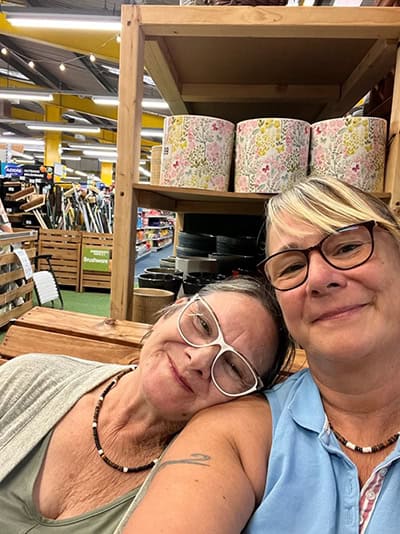
When Sharon’s mum, Monica, lost her partner and began struggling with her health, Sharon found herself trying to care from a distance—juggling a demanding job in Exeter with near-daily phone calls and constant worry about her mum, who lives alone with her two dogs in Barnstaple, Devon.
Sharon said: “Mum was always independent, but after losing her partner and being told she needed a hip replacement, she became withdrawn and physically frail. I was constantly worried.
“I’d ring every morning to check she was up, had taken her pills, had something to eat. It was overwhelming.
“She didn’t want a carer. She insisted she didn’t ‘need care.’ But with living over an hour and a half away, I knew I needed to find some kind of support for both of us.”
Sharon learned about new technology being offered by her employer, Bluebird Care N.E.W. Devon, in partnership with Access Health, Support and Care (HSC), using discreet technology-enabled care (TEC) to provide reassurance without intrusion.
The system, Access Assure, uses non-intrusive smart home devices – no cameras, no recordings – just sensors placed around the home to understand daily routines. Movements like opening a cupboard, boiling the kettle, and general mobility patterns are monitored, with alerts sent to family members if anything out of the ordinary occurs or daily living activity patterns change.
For Sharon, the reassurance was instant, and the relief had an immediate positive impact on her own wellbeing.
“Suddenly, I wasn’t waking up worried. I knew Mum was up and moving, when the kettle went on, when she’d opened the medicine cupboard. And I knew I’d be alerted if anything changed for Mum.
“It completely changed our dynamic. I could go back to being her daughter again, not just her carer.”
A Bluebird Care N.E.W Devon professional now visits once a week to check the equipment and provide some company.
What started as a technical check-in is now something Sharon’s mum actively enjoys, helping ease the path toward accepting future care, should she need it.
“I didn’t expect technology to bring us closer,” Sharon reflected. “But it has. When I visit now, we go out, we laugh, we just enjoy each other’s company again.”
The smart system behind Sharon’s peace of mind uses AI to learn her mum’s typical routines and flag any irregularities, like missed medication or disrupted sleep, while preserving her mum’s privacy.
It’s a lifeline that’s helping more families keep loved ones safe at home, without compromising their dignity or sense of autonomy.
“This has been a game changer for us,” Sharon said. “I’d recommend it to anyone.”
William Flint, Director for Bluebird Care N.E.W Devon, commented: “Using TEC has changed the way we think about care at home. It’s not just about early intervention or risk reduction, it’s about giving families space to reconnect, to be daughters and sons again for example, not just carers.
“It’s a powerful reminder that the right technology, used in the right way, can be deeply human.”
Andy Sparkes, Managing Director for Access TEC, added: “Access Assure is about more than sensors, smart technology, or even an intelligent dashboard that transforms data into meaningful action.
At its core, it’s about reassurance and restoring peace of mind. Families like Sharon’s shouldn’t have to choose between their loved ones living independently and their safety.
“This technology works quietly in the background, empowering individuals to live fulfilling and meaningful lives in the place they choose, while making sure someone’s always on hand if they need that extra layer of support.”
Following stories like Sharon’s, Bluebird Care N.E.W Devon is now preparing to roll out Access Assure across more of its services, bringing the benefits of TEC to families across the region.
The post Case study: How TEC reconnected a mother and daughter and provided reassurance appeared first on AT Today – Assistive Technology.
